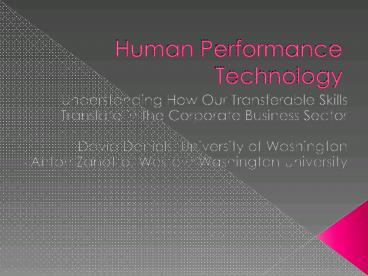Human Performance Technology - PowerPoint PPT Presentation
1 / 18
Title:
Human Performance Technology
Description:
– PowerPoint PPT presentation
Number of Views:382
Avg rating:3.0/5.0
Title: Human Performance Technology
1
Human Performance Technology
- Understanding How Our Transferable Skills
Translate in the Corporate Business Sector - David Daniels, University of Washington
- Anton Zanotto, Western Washington University
2
Program Overview
- Define Human Performance Technology
- Foundational Aspects
- Specific Concepts
- Connections with Housing/Residence Life
- Higher Education and Student Affairs
- Staff and Student Training
3
Defining Human Performance Technology
- Definition
- Using an engineering approach to attaining
desired accomplishments from human performers
(staff members) - Systematic
- Systemic
- Grounded in Theory
4
HPT is Systematic
- Organized and applied in a methodical manner
meant to be - Effective
- Results-Oriented
5
Effective
- Working to create performance improvements for
desired results - Not necessarily focused on efficiency
- Student Staff Supervision
- Focusing on individual development
- Encouraging balance of academic,
paraprofessional, and personal responsibilities
6
Results Oriented
- Emphasis on obtaining results
- Results come in very different formats
- Residence Hall Environments
- Encouraging being challenged AND creating a
safe environment for students
7
HPT is Systemic
- HPT focuses on how individuals and groups work
within a system, and seeks to consider - Ethical constraints
- Organizations as well as individuals
- Interventions
- A comprehensive view of the parts of a system
8
Ethical Constraints
- Existing ethical standards
- Adding value to environment
- Promoting the use of validated theories
- Working collaboratively
- Continually developing/improving self
- Practicing integrity
- Maintaining Confidentiality
- Student Affairs
- CAS Standards
9
Organizations and Individuals
- Understanding that organizations are made up of
people - Appreciation of organizational inertia in
conjunction with individual influence - Departmental Policies
- Managers vs. Staff
- Professionals vs. Student Staff
10
Interventions
- Interventions, both organizationally and
individually, serve as targeted tools for
specific issues - Student Affairs
- Supervision
- Conduct
- Conflict Resolution/Counseling
11
Comprehensive
- HPT considers the individual and the group
together - Evaluation of various aspects of a
situation/group - Student Development Theories
- Overlaying Theories to get holistic perspective
(Baxter Magolda, 2001 Jones McEwen, 2000)
12
HPT is Grounded
- HPT is grounded in scientific theory and
empirical evidence, leading to - Increased Productivity
- Designed and Developed individuals and groups
- Focus in Student Affairs on Information Based
Decision Making
13
Increased Productivity
- Productivity includes quality and quantity
- Provision of value added experiences
- Justifying Staff Development
- Better relationships
- Clearer goals
- Greater group unity
14
Design and Development
- Includes preparation of clear plans based on
theory and best practices - Student Staff Training
- Developing a logical set of training objectives
- Clearly laid out goals
15
Why does any of this matter?
- Reframing the discussion
- Seeing over the University walls
- Were not as different as we seem
16
Take Aways
- HPT offers a structured way of approaching our
work in Housing/Student Affairs - Many of our current practices are similar to and
can learn from those in the corporate world - Our skills are transferable!
17
Questions?
18
Resources
- Baxter Magolda, M. (2001). Making their own way
Narratives for transforming higher education to
promote self development. Sterling, VA Stylus. - Evans, N.J., Forney, D.S., Guido-DiBrito, F.
(1998). Student development in college Theory,
research, and practice. San Francisco, CA
Jossey-Bass. - Jones, S.R. and McEwen, M.K. (2000). A conceptual
model for multiple dimensions of identity.
Journal of College Student Development, 41, 4,
405-414. - Pershing, J.A. (Ed.) (2006). Handbook of human
performance technology. San Francisco, CA
Pfeiffer.































